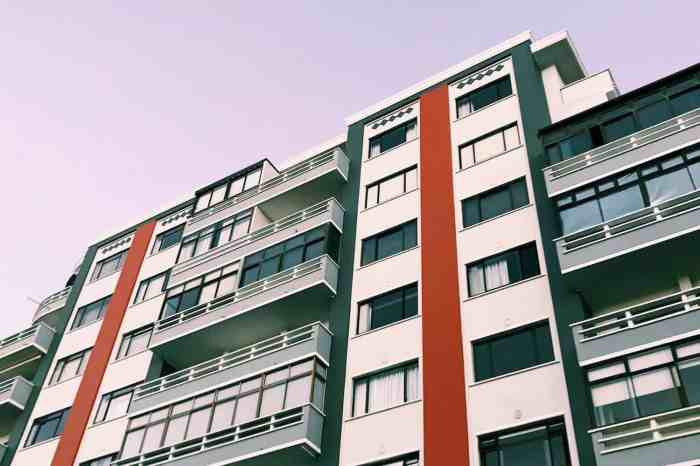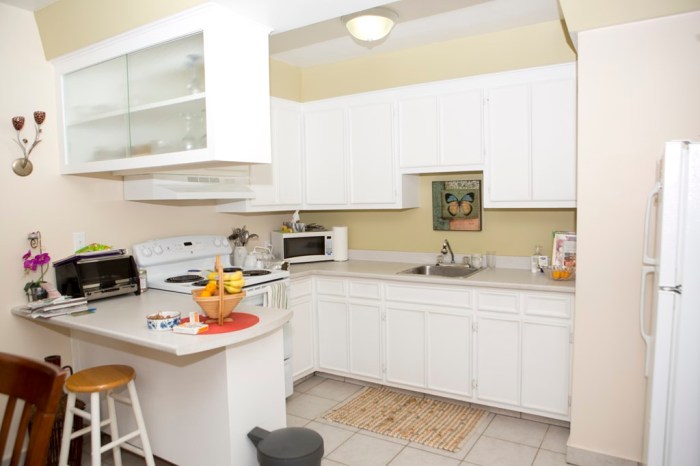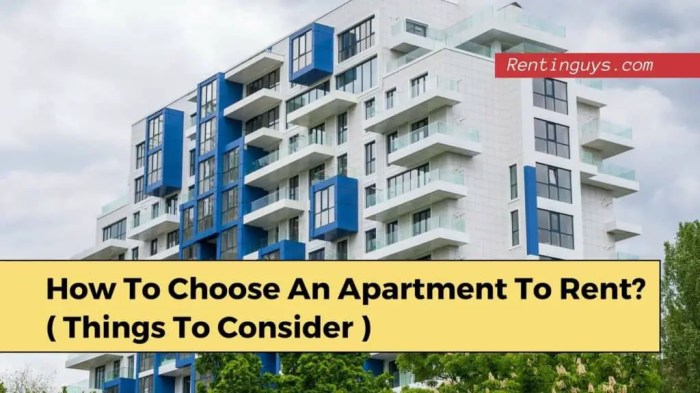How to choose the best apartment for rent is essential knowledge for anyone looking to navigate the vast rental landscape. In a world where options abound, making an informed decision can mean the difference between a comfortable haven and a regrettable choice. This guide explores key factors, practical steps, and financial considerations that will empower you to find an apartment that suits your needs and lifestyle perfectly.
From understanding the significance of location and amenities to evaluating nearby facilities, we delve into the vital criteria that influence your decision. Furthermore, we’ll provide a checklist for evaluating potential apartments, tips for effective communication with landlords, and insights into the legal and financial aspects of renting, ensuring that you are well-equipped to make a wise choice.
Factors to Consider When Choosing an Apartment
Choosing the right apartment involves a careful evaluation of various factors that can significantly impact your living experience. From location to budget and amenities, every element plays a crucial role in making an informed decision. Understanding these factors can lead to a fulfilling and comfortable living situation that meets your needs and expectations.
Key Considerations
In the quest for the perfect apartment, several key factors must be assessed to ensure a well-rounded decision. The following aspects are essential in determining the best fit for your lifestyle:
- Location: The geographical position of the apartment is paramount. Proximity to work, public transportation, and recreational areas can greatly enhance convenience and quality of life. For instance, an apartment located near a major transit hub can reduce commute times significantly, making daily life easier.
- Budget: Establishing a realistic budget is fundamental. This includes not only the rent but also utility costs, maintenance fees, and deposits. It’s advisable to aim for a rent that does not exceed 30% of your monthly income, ensuring financial stability while enjoying your living space.
- Size: The size of the apartment should cater to your specific needs. Whether it’s a cozy studio for a single individual or a multi-bedroom unit for a family, the layout and square footage directly influence comfort. Consideration of future needs, such as potential family growth, is also important.
Amenities and Their Impact on Living Experience
Amenities can significantly alter the allure of an apartment. They not only enhance comfort but can also provide additional value to the property. When considering amenities, the following factors should be taken into account:
- In-Unit Features: Items such as updated appliances, in-unit laundry, and air conditioning can greatly improve daily convenience. For example, having a washer and dryer eliminates the need for trips to a laundromat, saving time and effort.
- Building Amenities: Facilities such as gyms, pools, and communal areas contribute to a vibrant living environment. A well-equipped gym can encourage a healthier lifestyle without the need for external memberships.
- Security Measures: Safety features like secured entry, surveillance cameras, and on-site management are vital for peace of mind. A secure environment fosters a sense of community and well-being among residents.
Nearby Facilities and Their Influence
The availability of nearby facilities can also sway your apartment choice significantly. Access to essential services improves not just convenience but also overall lifestyle quality. Consider the following aspects:
- Educational Institutions: Proximity to schools or universities is crucial for families and students alike. Well-rated schools can often enhance property values, making them attractive to potential renters.
- Healthcare Access: Living near hospitals or clinics is essential for maintaining health and wellness. Quick access to medical facilities can alleviate stress during emergencies, making it a priority for many renters.
- Grocery Stores and Shopping Centers: Convenience stores and supermarkets nearby save time on errands and contribute to a better quality of life. A well-stocked grocery store within walking distance can be a deciding factor when choosing an apartment.
“Choosing an apartment is more than just finding a roof over your head; it’s about creating a lifestyle that aligns with your needs and aspirations.”
Steps to Evaluate Potential Apartments

Evaluating potential apartments is a crucial step in finding your ideal living space. With numerous options on the market, having a systematic approach can streamline the decision-making process and help you identify the best choice that meets your needs and preferences. By assessing each apartment carefully, you can avoid common pitfalls and ensure that you are making a well-informed decision.When visiting various apartments, a checklist can be invaluable.
It not only keeps you organized but also ensures that you don’t overlook important details. Here’s a comprehensive checklist of aspects to consider during your site visits:
Apartment Assessment Checklist
Include the following criteria in your checklist to evaluate each apartment thoroughly:
- Location: Proximity to work, schools, public transport, and amenities.
- Rent and Utility Costs: Monthly rent, included utilities, and average additional costs.
- Condition of the Apartment: Inspect walls, floors, appliances, and plumbing for maintenance issues.
- Natural Light and Ventilation: Check window sizes and orientations for sunlight and airflow.
- Storage Space: Assess closets, cabinets, and overall storage availability.
- Noise Levels: Consider the quietness of the neighborhood and the apartment itself.
- Parking Availability: Availability of parking spaces and any associated costs.
- Amenities: Access to building amenities like a gym, pool, or laundry facilities.
After visiting multiple apartments, creating a comparison method will help clarify which options best align with your personal criteria. Here’s how to set up an effective comparison strategy:
Organizing Apartment Comparisons
To make informed decisions, it’s beneficial to organize your findings methodically. Consider using a spreadsheet to compare different aspects of each apartment side-by-side. This can include the following:
- Apartment Name/Address: Identify each location for easy reference.
- Pros and Cons: List positive and negative features of each apartment.
- Cost Analysis: Document rent and utility costs for each option.
- Personal Ratings: Assign a score to each apartment based on your priorities.
This visual representation will help you weigh your options and identify which apartment aligns best with your lifestyle and budget.Effective communication with landlords or property managers can significantly enhance your apartment search experience. Here are some tips to ensure clear and productive interactions:
Tips for Communicating with Landlords or Property Managers
Establishing a positive rapport and clear communication can help in negotiating lease terms and addressing concerns. Here are key strategies to keep in mind:
- Prepare Questions: Develop a list of specific questions regarding lease terms, maintenance policies, and any other concerns.
- Be Professional: Approach communications in a polite and respectful manner to foster good relationships.
- Follow Up: If information is not provided during your first conversation, don’t hesitate to follow up for clarification.
- Document Everything: Keep records of all communications for reference and accountability.
By systematically evaluating potential apartments using comprehensive checklists, organized comparisons, and effective communication techniques, you can enhance your apartment hunting process and ultimately find a rental that meets your needs and lifestyle preferences.
Investigate the pros of accepting Tips for booking last-minute hotel deals online in your business strategies.
Financial Aspects of Renting an Apartment: How To Choose The Best Apartment For Rent

Renting an apartment involves more than just the monthly payment; it is essential to understand the financial implications fully. Multiple costs come into play, such as security deposits, utilities, and potential unexpected expenses. Navigating these financial aspects can help prevent surprises during your rental experience and enable you to make informed decisions.
Costs Involved in Renting
Understanding the various costs associated with renting an apartment is crucial. The primary expenses include:
- Security Deposits: Landlords typically require a security deposit, usually equivalent to one month’s rent. This deposit serves as a safeguard against damages or unpaid rent and is refundable at the end of the lease, provided the apartment is in good condition.
- Monthly Rent: This is the most predictable cost and is usually paid on a monthly basis. It’s important to ensure that your monthly rent fits comfortably within your budget.
- Utilities: Besides rent, tenants often need to cover utilities like electricity, gas, water, and internet. These costs can vary significantly based on location and usage, so it’s wise to inquire about average utility expenses from the current tenant or landlord.
Budgeting for Unexpected Expenses
Renting doesn’t only involve predictable costs; unexpected expenses can arise. It’s prudent to plan for these financial surprises to maintain your budget.
- Repairs and Maintenance: While landlords are typically responsible for major repairs, small maintenance costs may fall on the tenant. Allocating a portion of your budget for unexpected repairs can alleviate financial stress.
- Rent Increases: Be prepared for potential rent increases when renewing your lease. Typically, landlords inform tenants about potential changes in advance, allowing you to budget accordingly.
- Moving Costs: Don’t forget to factor in the costs associated with moving, which may include hiring movers, purchasing packing supplies, or renting a truck.
Negotiating Rent Prices or Terms, How to choose the best apartment for rent
Negotiation can play a significant role in securing a favorable rental agreement. Engaging in discussions with landlords can lead to beneficial outcomes.
- Market Research: Before negotiating, research comparable rental prices in the area. This knowledge can provide leverage during discussions and help justify your negotiation points.
- Timing: Approach negotiations at strategic times, such as during the off-peak rental season, when landlords may be more willing to lower prices.
- Offer to Sign a Longer Lease: Proposing to sign a longer lease can be an attractive option for landlords, as it secures them a reliable tenant for an extended period. This can lead to a more favorable rental price.
“Preparing for the financial aspects of renting an apartment is key to ensuring a smooth and stress-free experience.”
Legal Considerations in Renting an Apartment

When embarking on the journey of renting an apartment, it is crucial to navigate the legal landscape carefully. Understanding the terms of your lease agreement and being aware of your rights can save you from future disputes and financial losses. This section delves into essential lease terms, renters’ rights and responsibilities, and common pitfalls to avoid in rental contracts.
Essential Lease Terms to Review Before Signing
Before finalizing a rental agreement, it is vital to scrutinize specific lease terms that could impact your living experience and financial obligations. Key components of a lease may include:
- Duration of Lease: Clearly identify whether the lease is fixed-term or month-to-month. A fixed-term lease guarantees a rental rate, while a month-to-month arrangement offers flexibility but may come with price fluctuations.
- Rent Amount and Payment Terms: Confirm the rent amount, due date, and accepted payment methods. Ensure you understand any late fees or penalties for missed payments.
- Security Deposit: Understand the amount required, conditions for its return, and what deductions may be taken upon move out.
- Maintenance Responsibilities: Review the obligations regarding maintenance and repairs. Clarifying who is responsible for what can prevent disputes later.
- Termination Clause: Familiarize yourself with the conditions under which you or the landlord can terminate the lease, including notice periods required.
Renters’ Rights and Responsibilities
Being aware of your rights and responsibilities as a renter ensures a fair and equitable rental relationship. Renters generally have the right to safe and habitable living conditions, privacy, and protection against discrimination. Responsibilities typically include timely rent payment, adherence to lease terms, and maintaining the property.
“Understanding your rights is the first step in protecting yourself as a tenant.”
Common Pitfalls in Rental Contracts and How to Avoid Them
Rental contracts can contain traps for the unwary tenant. Recognizing these pitfalls can help you navigate the leasing process successfully. When reviewing a rental agreement, pay attention to the following potential red flags:
- Ambiguous Language: Avoid contracts with vague terms that can lead to misunderstandings. Seek clarity on any unclear provisions, such as those relating to subletting or pet policies.
- Unlisted Fees: Be cautious of additional fees not mentioned in the agreement. Asking for a breakdown of all potential costs can help you avoid surprise charges.
- Unreasonable Maintenance Clauses: Ensure that maintenance obligations are reasonable and do not place undue burden on you as the tenant. Contracts that require tenants to handle issues outside their control should be scrutinized.
- Lack of Signatures: An unsigned lease is not binding. Always ensure that both you and the landlord have signed the final version of the agreement.
By being diligent in your review of the lease and remaining informed about your rights and responsibilities, you can mitigate risks and enjoy a smoother renting experience.